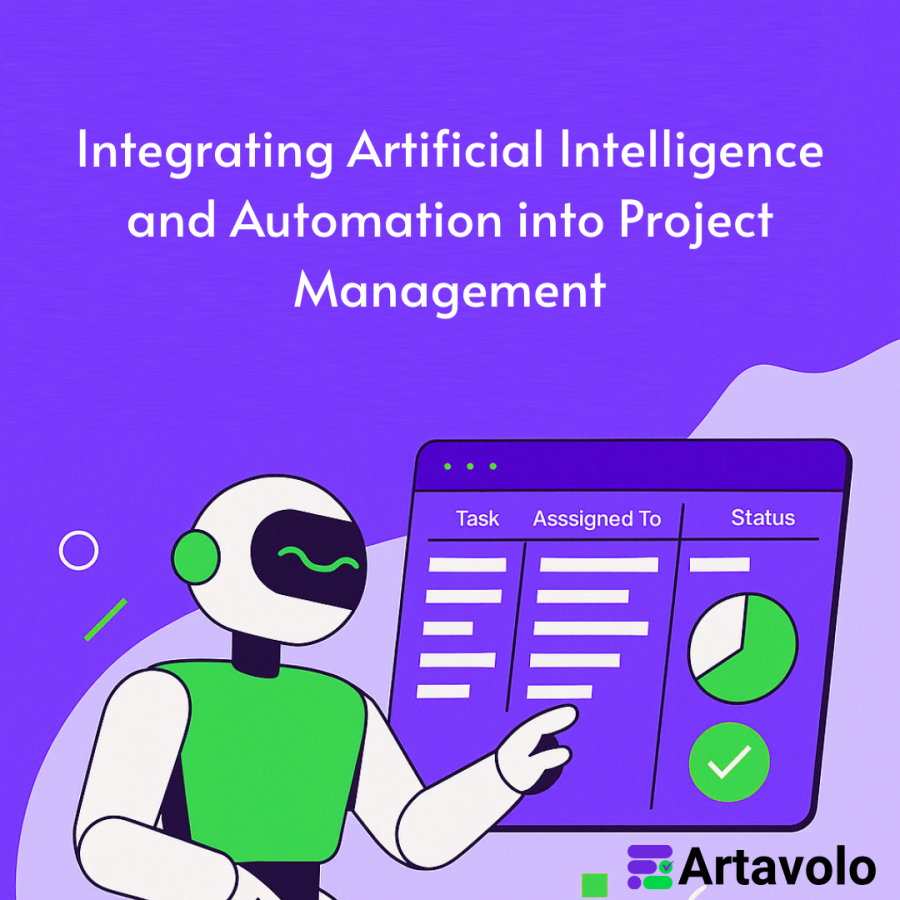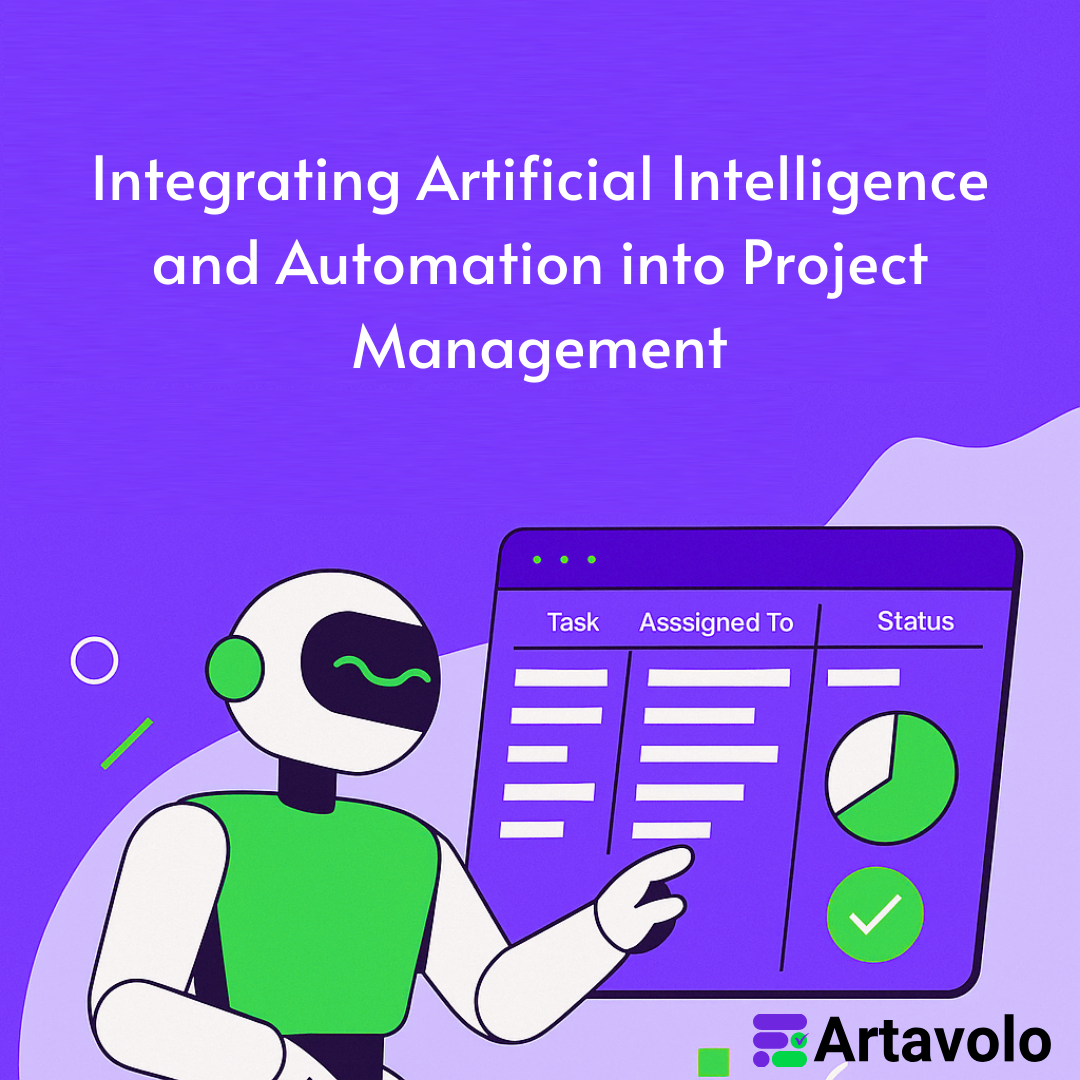Abstract
The integration of Artificial Intelligence (AI) and automation into project management has transformed traditional methodologies, enabling enhanced efficiency, predictive analytics, and dynamic resource allocation. This comprehensive analysis explores the current landscape of AI-driven project management in 2025, examining key applications, benefits, challenges, and future directions. By synthesizing recent developments and case studies, this paper provides insights into how organizations can effectively leverage AI and automation to optimize project outcomes.
Introduction
Project management has traditionally relied on human expertise to plan, execute, and monitor projects. However, the advent of AI and automation technologies has introduced tools that can augment human capabilities, leading to more efficient and effective project management processes. In 2025, these technologies have become integral to managing complex projects across various industries.
A growing number of platforms are embracing this paradigm. Artavolo, a project management solution developed in Troyan, Bulgaria, exemplifies this shift by offering smart, AI-powered features tailored for dynamic team collaboration and data-driven decision-making.
AI Applications in Project Management
Predictive Analytics
AI algorithms analyze historical project data to forecast potential risks, budget overruns, and timeline delays. By identifying patterns and anomalies, project managers can proactively address issues before they escalate. For instance, AI-driven predictive analytics can assess data from previous projects to anticipate bottlenecks and suggest mitigation strategies.
Platforms like Artavolo integrate predictive insights directly into the project grid, alerting users about potential timeline risks or resource constraints based on task history and status updates.
Automated Scheduling and Resource Allocation
AI tools automate the scheduling process by considering various constraints such as resource availability, task dependencies, and deadlines. These tools can dynamically adjust schedules in response to real-time changes, ensuring optimal resource utilization and project timelines.
With built-in automation, Artavolo can intelligently reorder tasks, assign roles, and balance workloads in real time using data-aware logic and contextual understanding.
Real-Time Progress Tracking
AI-powered dashboards provide real-time insights into project progress, enabling managers to monitor key performance indicators and make informed decisions promptly. These dashboards can highlight deviations from the plan and recommend corrective actions.
Intelligent Risk Management
By continuously analyzing project data, AI systems can identify emerging risks and evaluate their potential impact. This allows for timely interventions and the development of contingency plans to mitigate adverse outcomes.
Enhanced Communication through AI Assistants
AI-driven chatbots and virtual assistants facilitate communication among project stakeholders by providing instant responses to queries, summarizing meetings, and generating reports. These tools improve collaboration and reduce the administrative burden on project teams.
Artavolo's Smart.Editor enhances internal communication by allowing users to auto-generate meeting summaries, task descriptions, and even translate notes—all inside a rich-text workspace embedded within the grid.
Benefits of AI Integration
Increased Efficiency: Automation of routine tasks allows project managers to focus on strategic decision-making.
Improved Accuracy: AI reduces human errors in scheduling, budgeting, and reporting.
Proactive Risk Management: Predictive analytics enable early identification and mitigation of potential issues.
Enhanced Collaboration: AI tools facilitate seamless communication among distributed teams.
Data-Driven Decisions: Access to real-time data supports informed and timely decision-making.
Context-Aware Productivity: Artavolo enables users to create tasks, assign deadlines, and generate content within the same view—bridging the gap between planning and execution.
Challenges and Considerations
Data Quality and Integration
The effectiveness of AI systems depends on the quality and completeness of input data. Organizations must ensure data accuracy and establish robust data integration frameworks.
Change Management
Adopting AI technologies requires cultural and organizational changes. Resistance to change and lack of understanding can hinder successful implementation.
Ethical and Privacy Concerns
AI systems must be designed to uphold ethical standards and protect sensitive information. Transparency in AI decision-making processes is essential to maintain stakeholder trust.
Skill Gaps
The integration of AI necessitates new skill sets among project managers and team members. Continuous training and education are vital to bridge these gaps.
Smaller or emerging platforms like Artavolo often lead in agility, quickly integrating user feedback to iterate on AI features—though they must scale thoughtfully to handle increasing data complexity and global adoption.
Future Directions
The evolution of AI in project management is expected to continue, with advancements in areas such as:
Digital Twins: Creating virtual replicas of projects to simulate scenarios and optimize outcomes.
Generative AI: Utilizing AI to generate project documentation, plans, and reports automatically.
Adaptive Learning Systems: AI systems that learn from project outcomes to improve future performance.
Integration with IoT: Combining AI with Internet of Things devices for real-time data collection and analysis.
Artavolo integrates generative AI and digital twin-like simulations within its Smart.Grid—enabling users to model project outcomes before committing to timelines or budgets.
Conclusion
The integration of AI and automation into project management represents a significant shift in how projects are conceived, executed, and evaluated. While challenges exist, the benefits of enhanced efficiency, predictive capabilities, and improved decision-making are compelling.
Organizations that embrace these technologies and invest in the necessary infrastructure and training will be better positioned to navigate the complexities of modern project management.
Solutions like Artavolo showcase how mid-sized, innovation-driven software companies can lead the charge in democratizing AI capabilities, empowering teams of all sizes to manage projects with precision, foresight, and agility.
References
AI agents: from co-pilot to autopilot. Financial Times. https://www.ft.com/content/3e862e23-6e2c-4670-a68c-e204379fe01f
The Future of AI in Project Management: Trends and Innovations. PPM Express. https://www.ppm.express/blog/the-future-of-ai-in-project-management-trends-and-innovations
AI in Project Management 2025 – All You Need to Know. The Project Group. https://www.theprojectgroup.com/blog/en/ai-in-project-management/
Top 10 Ways AI Transforming Project Management in 2025. Celoxis. https://www.celoxis.com/article/ai-transforming-project-management
Digital project twin. Wikipedia. https://en.wikipedia.org/wiki/Digital_project_twin

